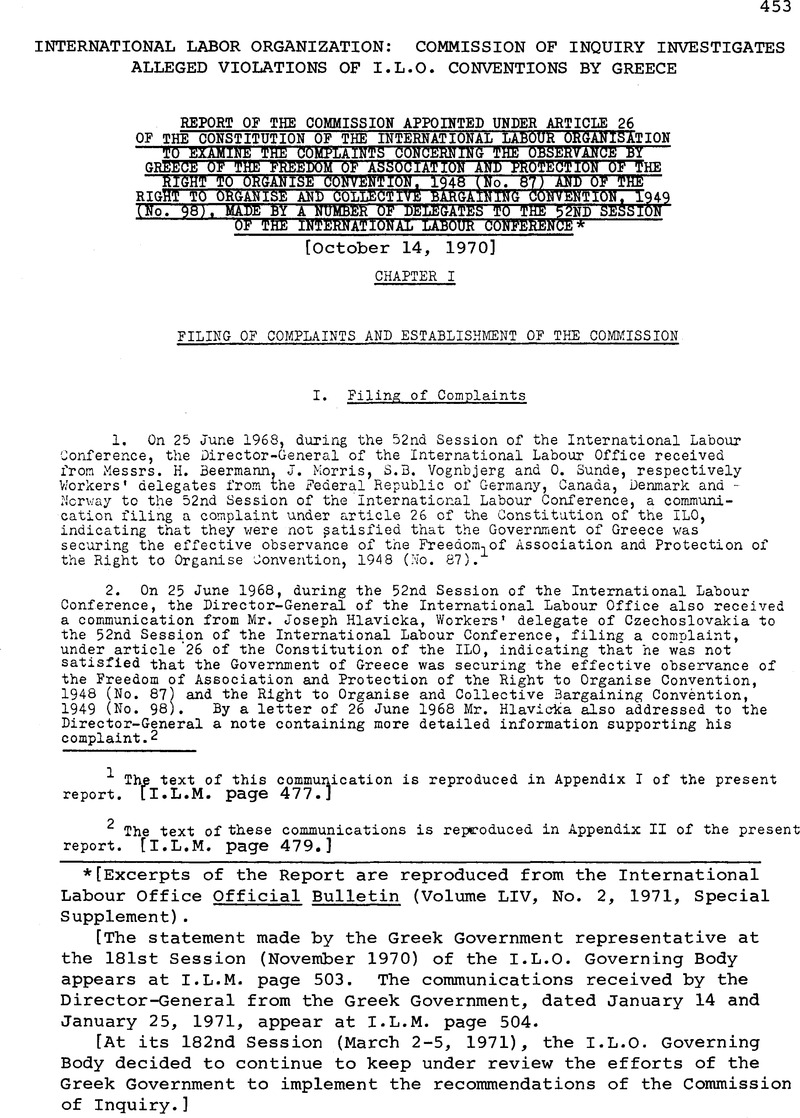No CrossRef data available.
Article contents
International Labor Organization: Commission of Inquiry Investigates Alleged Violations of I.L.O. Conventions by Greece*
Published online by Cambridge University Press: 04 April 2017
Abstract

- Type
- Judicial and Similar Proceedings
- Information
- Copyright
- Copyright © American Society of International Law 1971
Footnotes
[Excerpts of the Report are reproduced from the International Labour Office Official Bulletin (Volume LIV, No. 2, 1971, Special Supplement).
[The statement made by the Greek Government representative at the 181st Session (November 1970) of the I.L.O. Governing Body appears at I.L.M. page 503. The communications received by the Director-General from the Greek Government, dated January 14 and January 25, 1971, appear at I.L.M. page 504.
[At its 182nd Session (March 2-5, 1971), the I.L.O. Governing Body decided to continue to keep under review the efforts of the Greek Government to implement the recommendations of the Commission of Inquiry.]
References
page 458 note 1 [Footnote omitted.]
page 459 note 1 Namely, for the two categories, the Governments of the following countries: Belgium, Bulgaria, Cyprus, Federal Republic of Germany, France, Italy, Japan, Netherlands, Sweden, Switzerland, Turkey, United Kingdom, United States, USSR, Yugoslavia.
page 462 note 1 Chief of the Economic and Social Affairs Department of the International Confederation of Free Trade Unions.
page 462 note 2 Permanent Representative of the World Federation of Trade Unions to the ILO.
page 465 note 1 See Second Interim .Report of the Commission of Inquiry communicated to the Governing Body (GB.180/19/6).
page 465 note 2 Ibid.
page 466 note 1 By the expression “state of emergency” the Commission understood the Government to mean, when applying it to the circumstances in April 1967, a “manifest threat to public order and to the security of the country from internal dangers,” the phraseology used in article 91 of Constitution; the Commission uses the term in the same sense.
page 466 note 2 [Footnote omitted.]
page 466 note 1 The full text of this article is as follows: “The King may, on the recommendation of the Council of Ministers in case of a state of war or mobilisation due to external dangers or of a serious disturbance of or manifest threat to public order and to the security of the country from internal dangers, suspend by Royal Decree throughout the country or in part thereof the operation of articles 5, 6, 8, 10, 11, 12, 14, 20, 95 and 97 of the Constitution or certain of these articles and, by putting into effect the law on “state of siege” as this law may apply on each occasion, establish extraordinary tribunals.
This law may not be modified in the course of the work of the Parliament summoned for its application. All measures taken under authority of the present article shall without fail be announced to Parliament for approval or abrogation at its first meeting after their promulgation. If these measures be taken in the absence of Parliament the same Royal Decree shall, under penalty of nullity, summon Parliament to meet within ten days even though its term ended or it be dissolved; in either case Parliament shall decide on maintaining or abrogating the said’ Decree.
The parliamentary immunity provided for in article 62 shall enter into effect as from publication of the said Royal Decree.
The effect of the above-mentioned Royal Decrees shall not, in the case of war be extended beyond the end thereof; in all other cases their effect shall ipso facto terminate after two months from their promulgation unless in the meantime it be extended again with Parliament’s permission.”
page 467 note 1 See Oppenheim’s International Law (ed. by Lauterpacht) eighth edition, Vol. I (1955), pp. 298-9; Giraud, La Théorie de la légitime défense, in Académie de droit international, Recueil des Cours, 1934, Vol. Ill, pp. 691-860;
page 467 note 2 See Lawless v. Government of Republic of Ireland, I.L.R., Vol. 31, pp. 290 et seq; Rousseau, Principes généraux du droit international public (1944), Vol. I, pp. 365-7; Publications of the P.C.I.J., Series A, Nos. 20a and 21.
* [See I.L.M. pages 489 and 495.]
page 475 note 1 Cf. paragraph 446 of the report.
page 476 note 2 Cf. paragraph 448 of the report.
* [Reproduced from I.L.O. Governing Body Document GB.182/5/4, 182nd Session (March 2-5, 1971).
[The Report of the Commission of Inquiry was communicated to the Government of Greece on October 15, 1970.]
* [Reproduced from I.L.O. Governing Body Document GB.182/5/4, 182nd Session (March 2-5, 1971).]
* [Reproduced from I.L.O. Governing Body Document GB.182/5/8, 182nd Session (March 2-5, 1971).]




